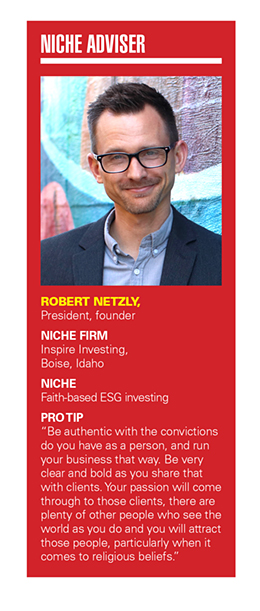

Despite having all the obvious characteristics of a niche advisory practice, Robert Netzly insists his focus on Christian values and faith-based ESG investing has always been less about appealing to a certain market than it is about staying true to his own beliefs.
“This is not the result of some business strategy; it’s a lifestyle,” said Netzly, president and founder of Inspire Investing, a Boise, Idaho-based registered investment adviser that has seen its assets double to nearly $2 billion over the past year.

Whether Netzly designed it to be so or not, his business is a classic example of how a niche can develop and prosper by following a playbook of homing in on a specific passion and never wavering. While business is going well these days for the RIA managing eight ETFs and employing two dozen financial advisers, Netzly still recalls leaving Wells Fargo Advisors in 2011 not sure if he would be able to attract a single client to his faith-based focus.
“This happened way faster than I ever thought it would,” he said. “When I decided to leave Wells Fargo, my plan to be the local adviser guy and if I really got successful, maybe hire an assistant someday.”
Netzly, 41, was in his third year at Wells Fargo when he stumbled upon the concept of biblically-focused investing, which became a kind of life-altering event for the devout Christian.
“It had never crossed my mind,” he recalls. “I was the president of a local pro-life pregnancy center, and I was making money off companies that were profiting from abortions, and so were my clients. I couldn’t imagine standing before the Lord someday and having to justify that.”
As it quickly sunk in, Netzly said, “Two weeks later I’m dead in the water at Wells, because I can’t even do my job with a clean conscience.”
“With two babies and a mortgage, I was this close to getting out of the business and going to seminary,” he said.
Instead, he moved to Next Financial Group and “started over from scratch.”
“It was just me and a laptop and I started sharing the story with people,” he said. “And people had the same reaction. Their eyes got big. God just blessed us. Business was booming and I had to bring on another adviser.”
The next level came in 2015, when Netzly broke off from Next Financial to launch Inspire Investing, which led to separately managed accounts and a customized impact score for investments and paved the way for a suite of ETFs.
“We were wealth managers, and we still are, but we didn’t have tools of the trade, so we needed to create those,” he said. “And we could only do that if we had our own RIA.”
Netzly sums up the faith-based portfolio construction process as “finding the most biblically-aware, positive companies, then we create low-cost indexes with the highest-scoring companies.”
The flagship Inspire 100 ETF (BIBL), for example, is an index carved out of the S&P 500 that has kept pace with the popular benchmark despite not owning any of the technology stocks that dominate the S&P’s performance.
Over the last three years, the $317 million BIBL produced returns of 27.7%, 22.6%, and 29.7%. That compares to 28.7%, 18.2%, and 31.2% for the S&P over the same periods.
While ESG and faith-based investing are sometimes viewed as opposite ends of the politically inspired investing spectrum, Netzly said there are only a few areas where he separates from traditional ESG screens.
“ESG is a super broad generic term,” he said. “Most ESG fund managers are from Manhattan or Boston, and they tend to apply progressive world views. With a faith-based perspective, most of the issues are very similar with the exceptions of some social issues, and abortion.”
While some might interpret Netzly’s business model as controversial and exclusive, he has attracted a diverse client base, 30% of which is non-Christian. And despite his personal views against gay marriage, Netzly said some of his clients are gay.
Financial advisers working at Inspire are asked to sign off on a statement of Christian beliefs and conduct, “as well as a statement on how we operate biblically responsible investing with our screens,” Netzly said.
“But as far as clients walking through the door, it doesn’t matter because we’re happy to serve everyone,” he added. “Wall Street has forgotten that there are millions of investors in this country who do believe the Bible, and if given the opportunity want their money managed that way. We encourage our companies to provide a safe, diverse, tolerant workplace, but we screen out companies that choose to take a social activist approach and take sides is a social debate. That’s not always a popular stance.”

Plus, a $400 million Commonwealth team departs to launch an independent family-run RIA in the East Bay area.

The collaboration will focus initially on strategies within collective investment trusts in DC plans, with plans to expand to other retirement-focused private investment solutions.

“I respectfully request that all recruiters for other BDs discontinue their efforts to contact me," writes Thomas Bartholomew.

Wealth tech veteran Aaron Klein speaks out against the "misery" of client meetings, why advisors' communication skills don't always help, and AI's potential to make bad meetings "100 times better."

The proposed $120 million settlement would close the book on a legal challenge alleging the Wall Street banks failed to disclose crucial conflicts of interest to investors.
Orion's Tom Wilson on delivering coordinated, high-touch service in a world where returns alone no longer set you apart.
Barely a decade old, registered index-linked annuities have quickly surged in popularity, thanks to their unique blend of protection and growth potential—an appealing option for investors looking to chart a steadier course through today's choppy market waters, says Myles Lambert, Brighthouse Financial.
